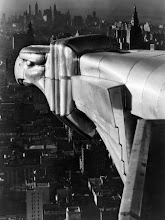Theater Review|'Waiting for Godot'The revolutionary Beckett play, considered a key piece in dramatic literature, is as interesting as it is evasive. Wrapped in repetition and monotony, the Roundabout Theatre’s new production now playing at Studio 54 makes one leave the theatre with more questions to be answered than might be expected. And isn’t that the point of Theater?
It’s been 50 years since the play was produced on Broadway. For a play of such eminence and popularity, it’s dizzying to believe that alarming fact. However, after seeing it, I have an inkling as to why it’s been ignored by producers and actors alike on the Great White Way: it just doesn’t fit into New York sensibility. Or, for that matter, American sensibility. It was originally written in French by an Irish playwright, after all. That must be responsible for some kind of culture shock, especially to Americans. The play is an existentialist’s dream, a sort of nonexistent, purposeless drama that uncomfortably forces one to consider the meaning of life. It does this in the run-around of the superficially meaningless dialogue ranging from theological debate to suicidal desperation, all done in an attempt to counteract the unbearable and inevitable silence that plagues the characters.
This kind of slow, melodic drama is almost unidentifiable to a modern audience. Nothing is spoon-fed, and it’s quite easy to dismiss the material as, dare I say, Seinfeldian absurdity. Probably an unfortunate side effect of being a member of Generation Y, it’s hard to get into the play if one is not willing to do so. Truthfully, the three people I saw it with were appalled, tired and regretful that they wasted their evening—not to mention money—on such a play. I’ll admit my mind wandered a few times, but nevertheless my head is still reeling from the content.
Nathan Lane leads the play as Estragon, the culinarily named quasi-protagonist, spending most of the play receding into the background in physical exhaustion and misanthropic ambivalence. For the character, it’s expected; for Mr. Lane, it’s not. “Typecasting” is usually comparable to career-suicide in the acting world, but the action of such is not without sense. We expect Mr. Lane to be brash, energetic and hilarious, and Estragon himself is not. As a result, Mr. Lane understandably struggles a bit, doing his best with the more serious material, but obviously over-performing his trademark sense of humor in the small bits of slapstick and one-liners the text offers. He is only half of the main character, though, as I absorbed it. Together with Bill Irwin’s self-evident and heartbreaking Vladimir, the two create a couple contemplating their actions, as well as their own lives, as they wait for a gentleman by the name of Mr. Godot. He never arrives, by the way.
In a world spearheaded currently by twittering and a general sense of impatience at the prospect of anything taking more than two seconds to arrive on our iPhones, this kind of unresolved conclusion may make one want to throw a tantrum right there on 54th street. I’m sure many would have wanted to, but their sense of decorum from societal pressure impeded these actions.
When Pozzo (John Goodman) enters the scene, led in the antediluvian manner of his servant Lucky (John Glover) on a rope, we are hoping for Godot. And by Godot, I mean the action of the play. Perhaps this jolly, domineering man will bring about some conflict. He does, in a way, with Mr. Goodman at least contributing some physicality to the play, most definitely a result of his immense size and presence. But it is Lucky’s logorrheic monologue, rife with biblical, societal and even scatological references, which hurls one of the play’s most intriguing moments. When we sit back and try to soak up every bit of cryptic or ludicrous speech, we are left moved.
It is at times hard to concentrate on the play, though. An ominous, Bergmanesque set, akin to the cinematography of “The Seventh Seal” might have been a little more fitting for the material, as opposed to the steep claustrophobic Disneyesque cove in which they now ponder. At the heart of the play is the cyclical pointlessness of life, but this existentialist theory is quite literally overshadowed by plastic trees, plaster rocks and a “sky” that is so clear it looks like a movie screen. I wonder why. Maybe because it is. There, I saved you any interpretation. Jane Greenwood’s costumes were typical of the production (Beckett envisioned only one thing about his characters: they would be wearing bowlers), although Mr. Goodman’s jodhpurs were most intriguing, perhaps because they are without a doubt the largest pair I have ever seen.
There is no end to this play; only the inevitable timidity and diffidence associated with life and its choices. We are left waiting, but know that nothing will ever arrive; we must set out to find it ourselves.
WAITING FOR GODOT
By Samuel Beckett; directed by Anthony Page; sets by Santo Loquasto; costumes by Jane Greenwood; lighting by Peter Kaczorowski; Presented by the Roundabout Theater Company, Todd Haimes, artistic director. At the Studio 54 Theatre, 254 West 54th Street, Manhattan; (212) 719-1300; Through July 5th. Running time: 2 hours 15 minutes.
WITH: Nathan Lane (Estragon), Bill Irwin (Vladimir), John Goodman (Pozzo), John Glover (Lucky), Cameron Clifford (Boy), Matthew Schechter (Boy).



No comments:
Post a Comment